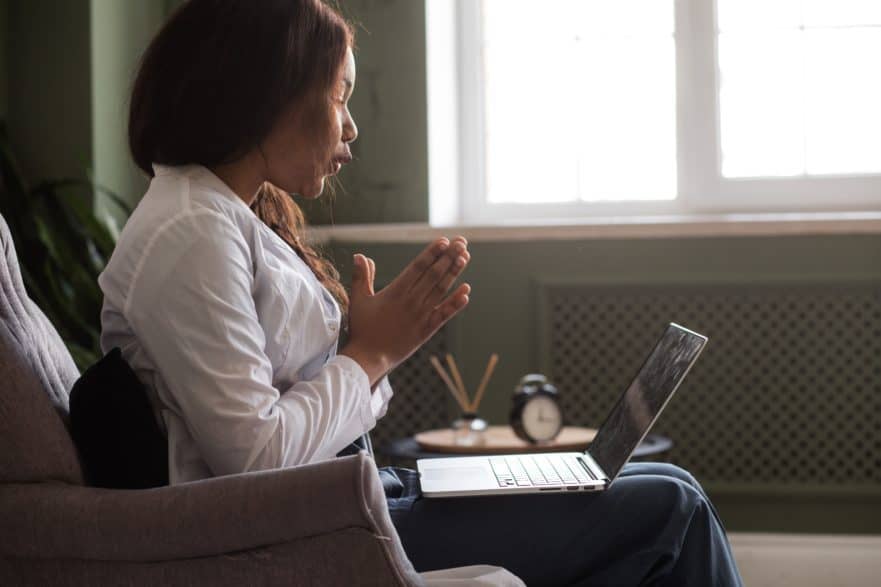The Coronavirus pandemic is changing the way we do lots of things—including how we attend therapy sessions. Where online therapy (also known as teletherapy) was once simply an option for people who were too busy to attend an in-person appointment, now it is the preferred method for people seeking to manage their mental health, especially during a time when so many negative factors are taking an emotional toll on us.
Here at Manhattan Mental Health Counseling, we currently offer online therapy exclusively as our offices remain closed. While we obviously prefer in-person sessions whenever possible, we are grateful to have this tool available to help people navigate these troubled times.
Online therapy involves a different set of dynamics compared to in-person sessions. It helps to be aware of these differences so you can adjust accordingly. The following tips will help you make the most of online sessions with your therapist.
Online therapy is here to stay. So make the most out of it by creating a apace, removing distractions, and protecting your privacy.
Creating a Space
When you come to the office for a therapy appointment, you’re entering a controlled environment, one that is designed by your therapist to make you comfortable and open. With online therapy, the counselor has no control over the space, so it’s up to you to create the best setting possible. This factor is more important than you might realize. If you have family or roommates living with you, simply setting up your laptop at the kitchen table might set the stage for all sorts of distractions, not to mention rob you of any privacy you might need in order to speak freely.
We realize there might not be a “perfect” environment inside your home or apartment. We encourage you to use a place that is as quiet, comfortable, and distraction-free as possible. If you live alone, this should be easy. If you have others living with you, use a space away from them. Many people cordon themselves off in their bedroom. Some creative people have even set up their closet as a quiet private space. Try to make the space peaceful and appealing—someplace you enjoy spending time. Make your bed and remove clutter. Set up some comfortable pillows if you’re sitting on the floor. Create some atmosphere with candles, aromatherapy or incense, if you like. Feel free to make this space like your personal sanctuary or retreat—or as near to it as possible.
Doing so helps you take ownership of your therapy session and puts you in a good mental space to have deep meaningful conversations with your therapist.
Remove Distractions
Disable your email and text notifications so they don’t pop up on your screen during your session. Better yet, turn off your phone and any mobile devices except the one you’re using for the video chat.
One common pitfall with having therapy sessions at home is that your home is filled with all the normal distractions of life. Distractions will take you out of the moment and lessen the value of your therapy session, so make every effort to remove yourself from anything that would steal away your attention. Set clear boundaries and stick to it. Make sure housemates or children know not to disturb you for the next hour. If your pet could distract you, have a housemate watch her for a while.
Protect Your Privacy
One of the biggest potential drawbacks to online therapy happens when the patient feels he/she can’t speak freely to the therapist because someone else is in earshot.
To maximize the effectiveness of your session, do everything possible to guard your privacy. Set a clear boundary for others living with you that you mustn’t be disturbed during your online session—or choose a time of day when you’re least likely to be disturbed.
Looking For Therapy?
Start Healing Today.
212-960-8626
If you’re not in a soundproofed room (as you likely won’t be), you may choose to speak in lower tones during your therapy session. Use headphones during your session so only you can hear what your therapist is saying.
On our end, you can rest assured that your therapist will be speaking from a private space, and we use a secure, HIPAA-compliant platform so your confidentiality online is protected.
Online therapy can never fully replace in-person sessions, but considering that this technology wasn’t available just a few years ago, we consider ourselves fortunate that we can stay connected and help clients during this challenging time.
Taking these few extra steps to prepare for your online session will help you get the most out of online therapy. To learn more about our online therapy options at Manhattan Mental Health Counseling and to schedule a session, click here.

